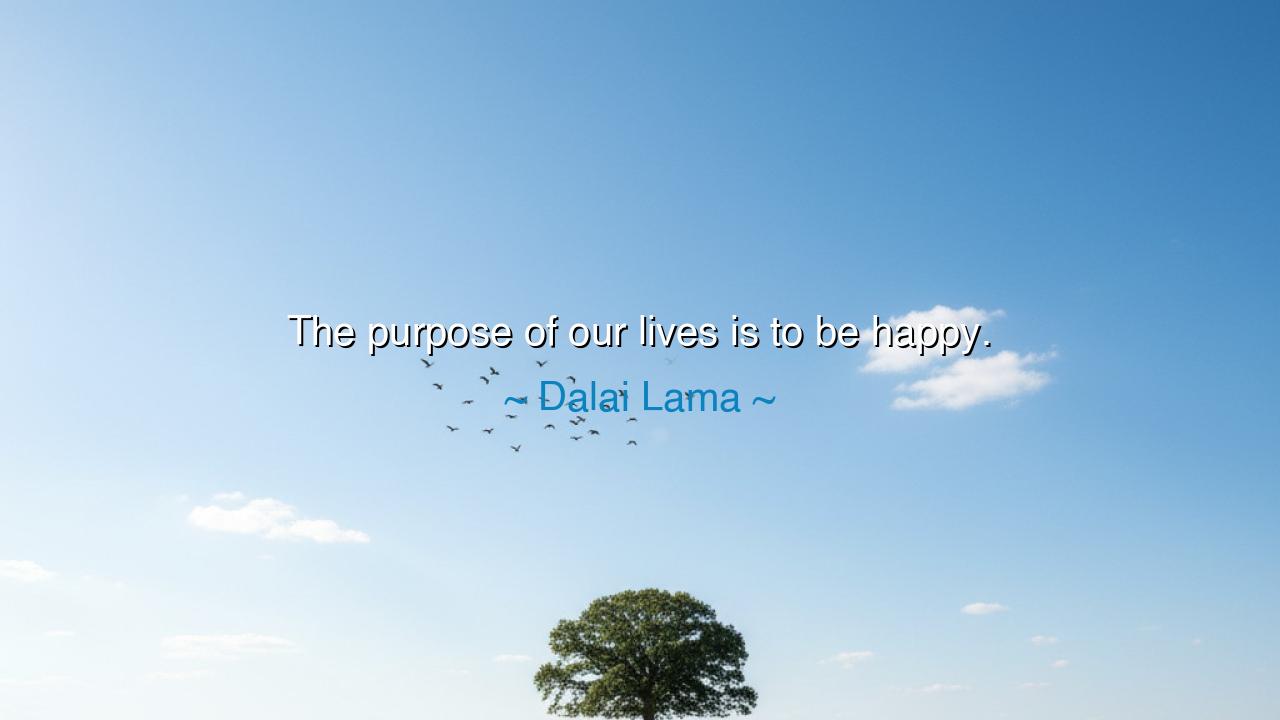
The purpose of our lives is to be happy.






In the serene simplicity of his teaching, the Dalai Lama, the spiritual leader of Tibet and a voice of compassion for all humanity, once declared: “The purpose of our lives is to be happy.” These few words, light as air yet weighty as truth, contain the essence of centuries of Buddhist wisdom. For in this statement lies not the fleeting pleasure of indulgence, but the radiant happiness of the spirit — the peace that arises when one lives with kindness, wisdom, and understanding. The Dalai Lama speaks not of a shallow joy, but of the profound contentment that comes from harmony within oneself and with all living beings.
The origin of this teaching is rooted in the very heart of Buddhist philosophy, which holds that all human beings seek happiness and strive to avoid suffering. From this simple observation, the Buddha built his Four Noble Truths — that suffering exists, that it arises from attachment and ignorance, that it can be overcome, and that the path to its end lies in right living and right understanding. The Dalai Lama, as the living heir to this wisdom, distills these vast teachings into one pure sentence: the goal of existence itself is happiness. Yet, he reminds us that this happiness is not found through possessions or victory over others, but through compassion, forgiveness, and peace of mind.
To be happy, then, is to be awake — to see life not as a race or a burden, but as a sacred opportunity to grow in love. The Dalai Lama teaches that true happiness arises when the mind is calm, the heart is open, and the self no longer wars with the world. When a person lives in alignment with compassion and truth, joy becomes as natural as breathing. This happiness is not dependent on wealth, beauty, or fame — it is the serenity that comes from living ethically, thinking kindly, and recognizing the divine in every creature.
Consider the life of Nelson Mandela, who endured twenty-seven years in prison yet emerged without hatred in his heart. When asked how he survived, he said, “As I walked out the door toward my freedom, I knew that if I did not leave my bitterness behind, I’d still be in prison.” This is the happiness that the Dalai Lama speaks of — a happiness not built upon circumstances, but upon the mastery of the soul. For even in hardship, one can find peace by choosing compassion over resentment, and forgiveness over vengeance. Mandela’s joy was the joy of liberation — not merely from his captors, but from the prison of anger.
The Dalai Lama’s wisdom also challenges the modern illusion that happiness must be earned through achievement or pleasure. The ancients knew otherwise. The Stoics of Greece, the mystics of India, and the saints of every faith taught that the only lasting joy is inner peace. The world offers temporary delights, but when the mind is restless, even luxury becomes a burden. The Dalai Lama reminds us that happiness is not something to chase — it is something to uncover, like sunlight behind clouds. The practice of compassion, gratitude, and mindfulness is the clearing of that sky.
The lesson is both simple and profound: if you wish to be happy, make others happy. The Dalai Lama teaches that when we live for ourselves alone, our joy is small and fragile. But when we live in service, in generosity of spirit, happiness expands beyond measure. In giving love, we receive it; in lifting others, we rise. To live with compassion is to participate in the happiness of the universe itself.
So, my children, remember this truth: the purpose of life is not to conquer but to connect, not to possess but to give, not to endure but to awaken. Seek happiness not in the applause of the world, but in the quiet blessing of a kind act, a forgiving heart, a grateful spirit. Each day, ask yourself: “Am I creating happiness — in myself and in others?” For as the Dalai Lama teaches, the divine purpose of life is fulfilled not in struggle or pride, but in joy — the joy of being alive, of loving freely, of walking gently upon this earth.
And when you live with such joy, you will discover that happiness is not a destination, but the very path itself — the way by which the soul returns to peace, and peace returns to the world.






AAdministratorAdministrator
Welcome, honored guests. Please leave a comment, we will respond soon